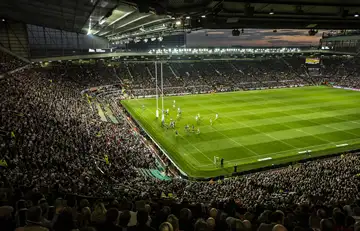Work together with rugby union, you say

Forty-20 editor-in-chief Tone Hannan issues a response to the piece written by The Independent’s Chief Sports Writer, Ian Herbert, No winners when two codes clash: Isn’t it time that rugby league and union started working together? To read that story, click here.
A healthier relationship between the two codes is indeed something to aim for Ian, but we are nowhere near that point yet.
I have a lot of admiration for Brian Carney. He is very often a voice of reason in a sport (league) that too often can’t see the wood for the trees. But in stating that union’s predatory intentions are consigned to history, he is mistaken.
If that were the case, why do ‘World Rugby’ (sic) continue to brand this the Rugby World Cup in the here and now? It’s a blatant power play to confirm international ‘ownership’ and imply there is only one true rugby code.
Similarly, why plan England’s final Rugby Union World Cup pool game in the very same city – Manchester – and on the very same night that the Super League Grand Final is staged every year if not to put the lowly northern code in its place, a strategy that has now hilariously backfired. If that is having a chip on our shoulder, pass the vinegar.
Such episodes are far from over, especially when and wherever league might suddenly look like getting on the front foot. See the recent jailing of Sol Makdad in the United Arab Emirates as just one very obvious example. There are – and will no doubt continue to be – more, as sure as Blame precedes Burgess.
Rugby league cannot just see itself as a victim in all of this; in some senses union is merely a commercial competitor acting in a way that many corporate entities do – attempting to wound and if possible obliterate the opposition any which way it can.
The 13-a-side code needs to value and then learn how to sell its essential authenticity, press on with the recent superb growth in the international game (far from ‘dismally uncompetitive’ as the writer puts it, beneath the level of the game’s top three sides at least) and co-ordinate more effectively with the cash-rich NRL in terms of competition structures, rules of the game etc.
None of that is easy, though, with the continual distraction and handicap of all those establishment-driven tanks on your lawn.
Jon Wilkin’s admission about league ‘not being a truly national game’ also has its roots in the same history books that you would have us ignore. The impact of over a century of bigotry based on hypocritical notions of professionalism and Corinthian amateurism (along with short-sighted and, ironically, extremely amateurish administration on league’s part) is still being felt in an age when the game is now belatedly putting down roots right across the land, at the same time as being essentially northern English at the top Super League level.
This ‘regional footprint’ that the London-centric media seems obsessed with has, at times, more often resembled a jackboot.
Comparisons between the respective qualities of the two – NB. TWO – rugby codes can indeed become petty, cliched and tedious. On the field, while similar in appearance these are two very different sports and ought to be viewed as such. One is no more skilled or complex than the other, once you understand the tactics and subtleties of what is going on.
From the league end of the equation, though, it is very difficult to innocently enjoy a sport when you know, in the back of your mind, that it would much rather you didn’t exist – and which has an army of vocal media and corporate cheerleaders urging it on.
If league and union really are going to start working together – or even, perish the thought, one day merge – then a simple apology for years of skulduggery from the buggers behind it all, the RFU at Twickenham, would be a start. I won’t hold my breath.